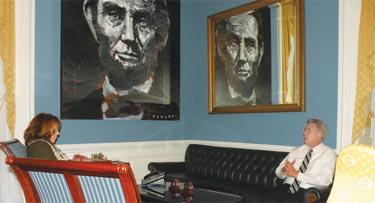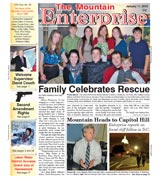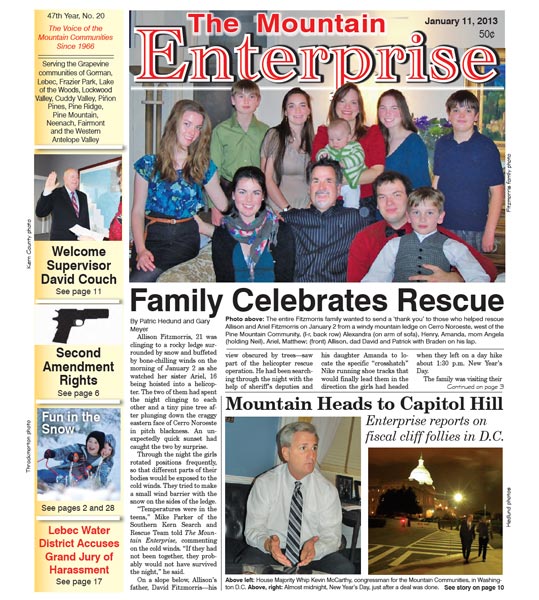
Image 1 of 2
House Majority Whip Kevin McCarthy of Bakersfield and the political tactics that led the nation toward the fiscal cliff dominated worldwide news at the end of 2012 and into the first day of 2013.
Image 2 of 2
McCarthy eagerly answered questions from The Mountain Enterprise Editor Patric Hedlund in his House Majority Whip office in the Sam Raburn building on New Years eve, as the clock ticked down toward tax hikes and global recession.
Enterprise reports on fiscal cliff follies in D.C.
By Patric Hedlund
At the end of 2012 the countdown to this nation’s drop over the fiscal cliff in Washington, D.C. was an international story. A member of the Mountain Communities’ home team was at the center of it.
Our District 22 Representative Kevin McCarthy, now House Majority Whip, has ridden the saddle of many convertibles through Lilac Festival and Fiesta Days parades in the Mountain Communities. Members of his wife’s family still live in Lebec.
McCarthy grew up in Bakersfield. He interned with Bakersfield’s 28-year Republican Congressman Bill Thomas as a student, then became a staff member, won election to California’s State Assembly, and was at the front of the line to be named Thomas’ successor when the powerful chairman of the House Ways and Means Committee retired from Congress at the end of 2007.
In his first two years in Congress, McCarthy was a whirlwind in seeking national media attention. After the midterm elections in 2010 in which the Tea Party shipped a new wave of conservatives to D.C., he was elected House Majority Whip. McCarthy took his place beside Majority leader Eric Cantor and House Budget Committee Chairman (and later vice presidential nominee) Paul Ryan. The three "Young Guns" symbolize a new spirit of power in Congress. Brinkmanship has been a prominent tool in their playbook.
The editor and the publisher of The Mountain Enterprise decided to go see for themselves how the process was unfolding that threatened to plunge the world back into another global recession. Without a deal between the House, the Senate and the White House, everyone in the United States would experience a major tax hike, longterm unemployment benefits would stop, crippling cuts to social services and military budgets would automatically be triggered. America’s inability to govern its own ship of state threatened to undercut its credit rating and its credibility on the world stage.
On December 31 at 2 p.m., 12 hours before the U.S. Senate would finally be able to deliver its historic 89-8 bipartisan vote on a measure designed to avoid the looming crisis of sequestration, The Mountain Enterprise was cordially greeted as constituents and members of the press by McCarthy and his staff at the Whip’s office in the Sam Rayburn office building. It is adjacent to the U.S. House and Senate Chambers in the iconic domed capitol building.
On the Senate side, Vice President Joe Biden and Republican Minority leader Mitch McConnell were still negotiating. The focus had shifted to them after Speaker of the House John Boehner’s efforts to deliver a "Plan B" solution had been bucked by a rowdy Republican representatives’ caucus on December 20. Boehner gave up and sent them home for the holidays.
In an in interview in his new Whip’s office, we asked McCarthy how he, as the Majority Whip, had left the Speaker of the House without sufficient votes lined up behind him. He replied that the real problem would have been if he had allowed the measure to go to the House floor without sufficient votes to pass the bill.
"You know, we don’t have earmarks anymore. It isn’t the same here now that the Whip doesn’t have that kind of tool to win votes," he explained.
In fact, the notion of bringing back earmarks—the questionable practice of offering sometimes millions of dollars for a congressperson’s pet project (remember Alaska’s Bridge to Nowhere?) in exchange for vote, as a way to twist arms and jump-start consensus—is being tossed around by Washington pundits in the wake of the epic gridlock of the 112th Congress.
McCarthy walked us through the Whip’s office, where a group of anxious-looking staffers were hunkered over computer screens with lists of representatives’ names. In a back room a staffer wrestled the cords of a phone system like a wrangler having trouble with his lariat.
The Senate worked on into the night, finally successfully voting at 2 a.m. January 1, 2013 to send their bipartisan compromise measure to the House of Representatives. It raised taxes only on households earning over $450,000 a year; locked in tax cuts for others; pushed harsh sequestration budget cuts two months down the road; extended longterm unemployment benefits; extended elements of the contentious Farm Subsiday Bill; made a temporary fix to the fees paid to doctors by Medicare, and held a few other elements.
When the Senate bill was ready, it was sent over to the the House of Representatives. House Democrats and Republicans both flew into caucus rooms-separately. The Democrats emerged first to endorse the deal and call upon their Republican colleagues to do likewise.
The Republicans hold their caucus in the basement of the capitol building. With 100 other members of the press, at 5 p.m. on January 1, The Mountain Enterprise joined the stake-out in the dark halls with plumbing and ductwork overhead to watch for a sign of the Republicans’ decision. A ripple of applause was heard through the door at about 6:30 p.m. A couple of representatives broke out of the pack by about 7 p..m. to tell us that the caucus wanted to see if they could get 217 votes for an amendment to send back to the Senate. The press knew this was political "show biz," because the Senate had already broken and dispersed. They would not be able to take up an amendment before the swearing in of the 213th Congress on Thursday, Jan. 3.
Representatives we talked to in the halls said some members of the caucus wanted to require that $300 billion in spending cuts be made elsewhere to pay for the costs of the compromise bill.
If they could not gather enough votes, they would take up the Senate bill as an up or down vote, John Fleming of Louisiana told us.
It took almost five more hours of negotiations, counting, another caucus and political theatrics before the Whip’s count signaled that the amendment would fail if it were brought to the floor for a vote. Instead the Senate measure was brought to the floor.
John Boehner walked briskly to the floor of the House chambers and cast his vote in favor of the compromise. McCarthy voted against it. It passed 257-167. Wall Street rejoiced the next day.
See the February issue of The New Mountain Pioneer for more on this story.
This is part of the January 11, 2013 online edition of The Mountain Enterprise.
Have an opinion on this matter? We'd like to hear from you.


